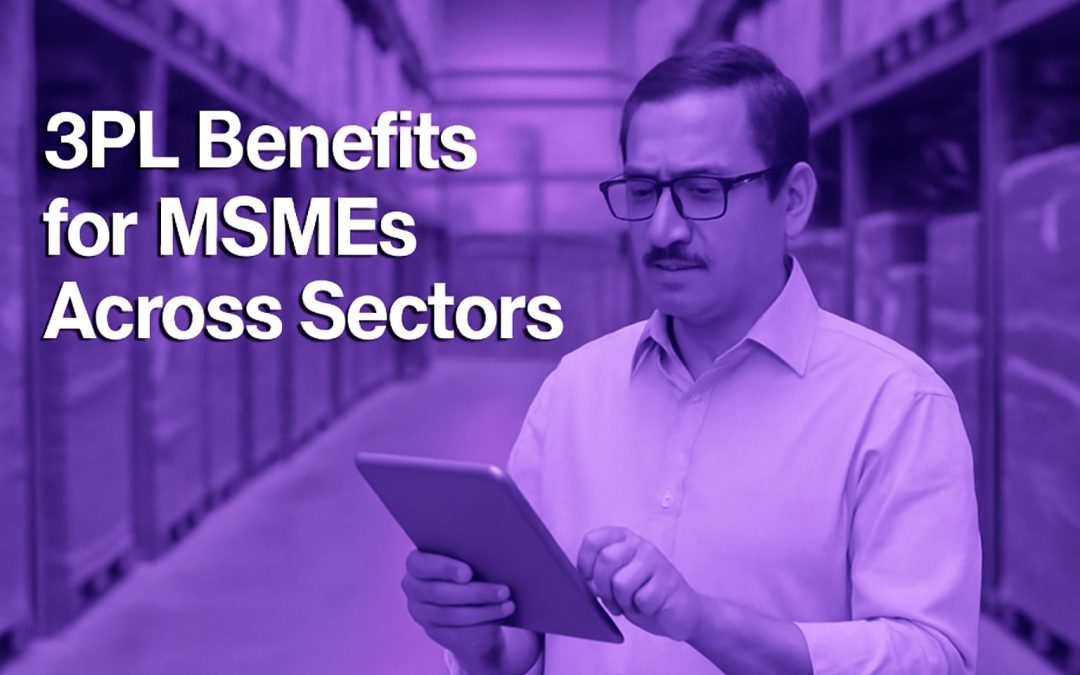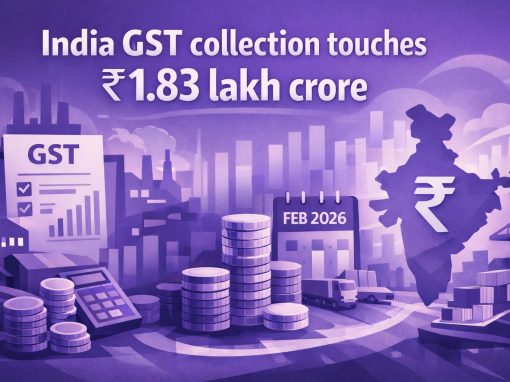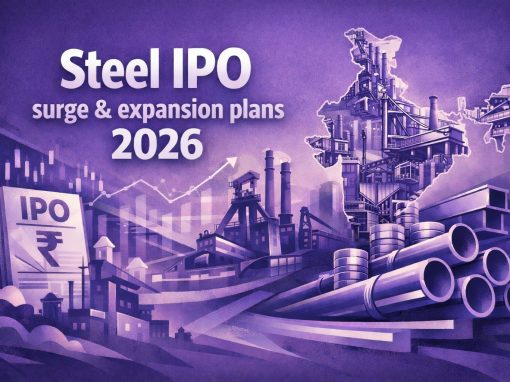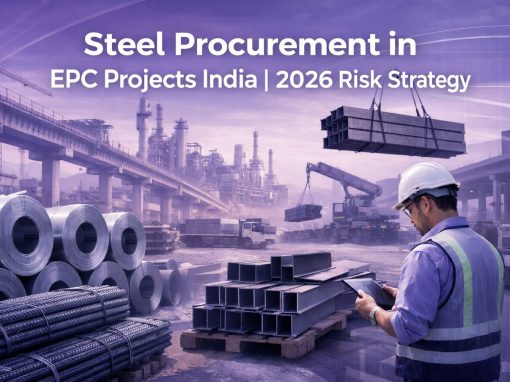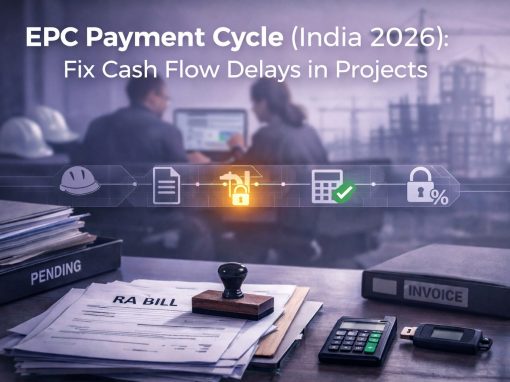Table of Contents
- Elements of 3PL
- Benefits of 3PL for Manufacturing Sector
- Benefits of 3PL for Construction and Building Materials Sector
- Benefits of 3PL for Retail and E-commerce Sector
- Benefits of 3PL for Agriculture and Food Processing Sector
- Benefits of 3PL for Pharmaceuticals Sector
- Benefits of 3PL for Electronics and Consumer Goods Sector
- Benefits of 3PL for Handicrafts and Artisanal Sector
- Conclusion
3PL stands for is third-party logistics, and it refers to services that offer supply chain and logistics operations such as warehousing, packaging, transportation, and order fulfilment to businesses. In other words, many businesses instead of using their own fulfilment services, outsource them to 3PL service providers. 3PL benefits for MSMEs are innumerable.
Depending on scale, a 3PL solutions service could be a single provider covering only transportation or can be a systemwide package of services encompassing the entire 3PL supply chain management.
What are the Elements of a 3PL Process?
While there are a range of services that a third-party logistics provide, here are a few common elements of the 3PL process.
FTL and LTL Freight Shipping
In shipping, Full Truck Load (FTL) is used for large shipments that utilises the entire truck for transportation. In FTL your shipment is the only freight moving to the destination. On the other hand, in Partial Truck Load (PTL) several smaller shipments from different businesses fill one truckload.
Both FTL and LTL are important in logistics and give you the option to choose how to transport freight between the warehouse to your delivery centre as per your requirement. There are several outsourced third-party logistics companies in the market who can guide you through this process and arrange for FTL or LTL loads.
For instance, with Tata nexarc’s Logistics, MSMEs and emerging businesses can find reliable logistics partners to transport goods at affordable prices across 19,000+ PIN codes across India.
E-commerce Platform Integration
In order to facilitate omnichannel selling, 3PL logistics service providers use technology to enable integration of multiple sales platforms. This in turn will help you to view and track the status of your orders in real time online through a common dashboard.
Inventory Management
3PL benefits for MSMEs also have include inventory management. 3PLs help you manage businesses manage stock and offer advice on restocking levels, supply chain management, and standard seasonal inventory levels.
Picking, Packing, and Shipping
This forms the core of E-commerce fulfilment. In this process, once the customer places an order through any of the sales channel, it reaches the fulfilment centre where the concerned person identifies the order, packs it in suitable boxes and duly labels it. The order then gets picked up by the career for delivery.
Same-day Shipping
Another option that 3PL offers is same-day shipping where the order is picked, packed and shipped within the same day when the order is placed. While same day deliveries enable faster delivery of goods to customers, there is usually a cut off time to place the order.
Reverse Logistics
Return pickup from customers or reverse logistics is another 3PL benefit for MSMEs. This involves checking returned items for damage and returning the undamaged items back to shelf for purchase again.
3PL in the Manufacturing Sector
India’s manufacturing MSMEs cover a wide range of fields, such as chemicals, machinery, electronics, textiles, and consumer goods. Here is a look at 3PL benefits for MSMEs in these fields.
Getting Raw Materials: Making sure that raw materials are delivered on time so that production schedules can stay on track.
Warehousing: Offering storage options that make the best use of space and help with inventory management.
Inventory Management: Setting up systems to keep an eye on and control stock levels in an effective way.
Distribution: Making sure that finished goods get to the right markets and customers.
Benefits of 3PL for Manufacturing Sector
Cost Reduction
- Eliminates the need for significant capital investment in logistics infrastructure.
- Offers economies of scale, thereby reducing per-unit transportation and warehousing costs.
- Decreases overhead expenses associated with fleet management and staffing.
Access to Advanced Technology
- Provides access to state-of-the-art logistics technologies, including Warehouse Management Systems (WMS) and Transportation Management Systems (TMS).
- Enhances visibility and control over supply chain operations through real-time tracking and data analytics.
Scalability and Flexibility
- Allows MSMEs to scale operations up or down based on market demand without the need for significant capital investment.
- Offers flexibility in service offerings, enabling businesses to adapt to changing market conditions.
Risk Mitigation
- Helps in managing risks associated with supply chain disruptions, such as delays, damages, or regulatory changes.
- Provides contingency planning and compliance management to minimise operational risks.
- Lets MSMEs grow or shrink their businesses based on market demand without having to spend a lot of money.
- Allows businesses to change their services to meet the needs of the market.
Risk Reduction
- Helps MSMEs deal with the risks that come with supply chain problems like delays, damage, or changes in the law.
- Offers compliance management and contingency planning to lower operational risks.
Future of 3PL in the Manufacturing Sector
As the manufacturing industry changes, 3PL providers will be able to do even more with Industry 4.0 technologies like automation and artificial intelligence. These technologies will help manufacturing MSMEs meet the needs of a changing market by giving them more efficient ways to do things.
3PL in the Construction and Building Materials Sector
Efficient logistics is crucial for manufacturing products such as cement, steel, pipes, construction equipment, and other essential materials. The role of 3PL providers in this sector is vital in optimising the supply chain and supporting the timely delivery of bulk goods to construction sites.
Bulk Material Handling: Managing the transportation of large quantities of construction materials, ensuring they reach the site without damage or delay.
Timely Delivery to Construction Sites: Coordinating the movement of construction materials to job sites, ensuring that projects are not delayed due to supply chain disruptions.
Inventory Management: Offering storage solutions and stock management for building materials, ensuring that the right materials are available at the right time without overstocking or stockouts.
Heavy Equipment Logistics: Ensuring the safe and efficient transportation of heavy construction equipment to various job sites, which requires specialised handling and vehicles.
Top Benefits of 3PL for Construction and Building Sector
Efficient Bulk Material Transport
- 3PL providers help streamline the supply chain by managing the loading, unloading, and transportation of bulk materials, making the entire process more efficient and less prone to delays.
- Specialised transportation ensures that materials arrive in the condition required for immediate use on construction sites, reducing the need for reordering or delays caused by damaged goods.
Timely Delivery to Job Sites
- Construction projects are often dependent on the timely arrival of materials to avoid delays. 3PL providers ensure that materials such as cement, steel, and equipment reach construction sites on time, preventing project stoppages.
- With vast transportation networks and the ability to scale, 3PL partners can handle large orders and deliver materials to multiple sites simultaneously, improving delivery speed and efficiency.
Inventory Management and Storage Solutions
- Efficient inventory management helps avoid material shortages on construction sites, ensuring that work can continue without interruption due to missing materials.
- By providing temporary storage and managing logistics, 3PLs benefits MSMEs, reduce warehousing costs while ensuring that materials are available when needed.
Specialised Equipment Handling and Transport
- Heavy equipment such as cranes, bulldozers, and mixers require specialised transportation and handling. 3PL providers have the necessary resources, such as low-loaders, cranes, and flatbed trucks, to move heavy construction equipment safely and efficiently.
- Ensures that construction machinery and equipment arrive at job sites without delays, reducing downtime on construction projects and improving productivity.
Future of 3PL in the Construction and Building Sector
With the advent of automation, AI-driven route optimisation, and real-time tracking technologies, 3PLs will be able to offer even more efficient and transparent logistics solutions. These advancements will help construction MSMEs reduce costs, minimise delays, and optimise the movement of bulk materials and heavy equipment, ultimately contributing to faster and more cost-effective project delivery.
3PL in the Retail and E-commerce Sector
India’s retail and e-commerce MSMEs include online retail, fashion, consumer electronics, and home goods. Let us explore the benefits 3PL providers provide retail MSMEs.
Order Fulfilment: Efficient handling of order processing from the time an order is placed to its delivery, ensuring prompt and accurate shipments.
Last-Mile Delivery: Ensuring timely and cost-effective delivery to customers’ doorsteps, which is crucial for customer satisfaction and repeat business.
Inventory Management: Implementing advanced inventory management systems that ensure stock availability without overstocking.
Returns Management: Streamlining the process for handling returns and exchanges, a key component of customer service in the E-ccommerce industry.
Top Benefits of 3PL for Retail and E-commerce Sector
Cost-effective Warehousing
- Maintaining dedicated warehouse space can be costly for small and medium-sized retail businesses. 3PL providers offer scalable warehousing solutions, allowing MSMEs to only pay for the storage they need, reducing overheads.
- 3PLs help optimise warehouse operations with better space utilisation, reducing costs associated with warehousing, and improving order fulfilment speed.
Faster Order Fulfilment
- With access to a wider network of fulfilment centers and regional distribution hubs, 3PL providers enable retail MSMEs to expedite order fulfillment, often ensuring same-day or next-day delivery, which are crucial in meeting consumer expectations.
- Speedy services help retail businesses stand out in a competitive market, where customers expect fast and reliable shipping.
Scalability for Seasonal Demand
- 3PL providers offer flexible solutions that scale according to peak season demands, handling increased volume without requiring permanent investments in infrastructure.
- This adaptability allows retail MSMEs to meet heightened demand without the risk of under- or over-stocking, ensuring smooth operations during busy seasons.
Geographic Reach Expansion
- Retail MSMEs often face challenges in expanding their geographic reach due to logistical constraints. By partnering with 3PLs, businesses can tap into a wider market, even expanding internationally, without having to manage the complexities of cross-border logistics.
Future of 3PL in the Retail and E-commerce Sector
With advancements in technology like AI, automation, and predictive analytics, 3PL providers will be able to offer more efficient and tailored logistics solutions to MSMEs. Additionally, the growth of omnichannel retail, cross-border e-commerce, and demand for sustainable delivery solutions will further drive the need for innovation in logistics. MSMEs that adopt these advancements, in partnership with 3PL providers, will be well-positioned to thrive in a competitive and dynamic market.
3PL in the Agriculture and Food Processing Sector
India’s agriculture and food processing MSMEs focus on sectors such as fruits and vegetables, dairy products, packaged food, grains, spices, and processed foods. Given the perishable nature of many agricultural products, the role of 3PL providers becomes essential in ensuring the efficiency and sustainability of these operations.
Cold Chain Logistics: Ensuring temperature-controlled environments for perishable goods, including fruits, vegetables, dairy, and processed food, from farm to consumer.
Transportation and Distribution: Providing dedicated transportation solutions that maintain the required temperature range during transit and enable the efficient distribution of goods to retailers and wholesalers.
Inventory Management: Offering warehouse management systems that enable efficient stock control, prevent overstocking or stockouts, and reduce wastage in the food supply chain.
Packaging and Handling: Ensuring that products, especially fragile ones like fruits, vegetables, and dairy, are safely packaged and handled to maintain their quality throughout the logistics process.
Compliance with Safety Standards: Adhering to food safety regulations such as FSSAI (Food Safety and Standards Authority of India) guidelines, ensuring that food products are handled, stored, and transported in line with industry standards.
Top Benefits of 3PL for Agriculture and Food Processing Sector
Maintaining Product Quality
- 3PL providers specialising in cold chain logistics ensure that perishable products like fruits, vegetables, dairy, and processed foods are transported and stored within the optimal temperature range. This minimises spoilage, preserves the nutritional value, and maintains the overall quality of products, ultimately leading to higher customer satisfaction and lower wastage.
Reduction in Wastage
- 3PL providers help MSMEs reduce product wastage by preventing overstocking and understocking products with efficient inventory management.
Regulatory Compliance
- The food industry in India is governed by stringent regulations such as FSSAI guidelines for food safety. 3PL providers ensure that agricultural and food products comply with these regulations during storage, transportation, and delivery. This compliance helps MSMEs avoid penalties and ensures that the products meet national and international safety standards.
Faster Time-to-Market
- Timely delivery is crucial in the food industry, especially for fresh produce and dairy. 3PL providers streamline transportation and distribution processes to ensure quick movement of goods, minimising the time between production and sale.
Cost Savings
- By outsourcing logistics to 3PL providers, agriculture and food processing MSMEs can reduce the need for heavy investments in temperature-controlled warehouses, dedicated transportation fleets, and specialised equipment. 3PLs leverage their established networks, which can lead to economies of scale, reducing the overall cost-per-unit for MSMEs.
Future of 3PL for Agriculture and Food Processing
Technological advancements will help 3PL providers deliver even more optimised solutions, enabling agriculture and food processing MSMEs to meet growing consumer demands while ensuring sustainability and compliance.
3PL in the Pharmaceuticals Sector
India’s pharmaceutical MSMEs are vital contributors to both the domestic and global healthcare supply chains, producing generic drugs, over-the-counter medications, medical devices, and health supplements. These sectors face stringent regulatory requirements and must ensure their products’ integrity, safety, and compliance during transportation and storage. 3PL providers are crucial in meeting these needs by offering specialised logistics solutions tailored for the pharmaceutical industry.
Cold Chain Logistics: Maintaining strict temperature control for temperature-sensitive products like vaccines, biologics, and certain drugs.
Regulatory Compliance: Managing logistics in accordance with industry standards such as GDP (Good Distribution Practices) and GMP (Good Manufacturing Practices).
Timely Distribution: Ensuring fast and reliable deliveries of pharmaceutical products to healthcare providers, pharmacies, and distributors.
Inventory Control: Implementing systems that allow for real-time tracking, ensuring that stock levels meet demand without surplus or shortages.
Top Benefits of 3PL for Pharmaceuticals Sector
Ensuring Regulatory Compliance
- 3PL providers handle all required documentation and ensure that products are transported in accordance with national and international regulatory guidelines, mitigating the risk of non-compliance.
- Ensures adherence to food and drug safety laws, avoiding regulatory penalties and maintaining market access.
Cold Chain Management for Temperature-Sensitive Products
- 3PL providers offer advanced cold chain solutions for temperature-sensitive pharmaceuticals such as vaccines, biologics, and insulin.
- Real-time monitoring of temperature, humidity, and other conditions reduces the risk of product spoilage, which is critical in the pharmaceutical sector, especially for life-saving drugs and vaccines.
Timely and Reliable Delivery
- 3PLs use optimised routing and extensive distribution networks to ensure that products reach healthcare providers and pharmacies without delay.
- On-time delivery is crucial for meeting the demand for both routine and emergency medicines, especially during health crises or outbreaks.
Efficient Inventory Management and Stock Control
- 3PL providers offer sophisticated inventory management systems that help pharmaceutical MSMEs manage stock levels efficiently, reducing the risks of stockouts or overstocking.
- Real-time tracking and automated replenishment systems ensure that pharmaceutical products are available in the right quantity at the right time, reducing waste and ensuring availability in the market.
Future of 3PL for Pharmaceuticals
The pharmaceutical industry will continue to evolve with the increasing demand for generic drugs and medical devices. As technologies like blockchain, AI, and automation gain prominence in the logistics industry, 3PL providers will offer more efficient and transparent supply chain solutions. Real-time tracking, predictive analytics, and automation in cold chain management will allow pharmaceutical MSMEs to further optimise their operations and reduce costs.
3PL in the Electronics and Consumer Goods Sector
India’s electronics and consumer goods MSMEs include manufacturers of electronics, gadgets, home appliances, and other high-value products. These businesses face unique challenges related to handling fragile, high-value products and meeting the fast-paced demand of the competitive market. Efficient logistics is essential to ensure the timely delivery and protection of these products.
Warehousing and Storage: Ensuring the proper storage of fragile, high-value products in climate-controlled, secure facilities to prevent damage and theft.
Inventory Management: Managing inventory levels with advanced tracking systems to avoid stockouts, overstocking, and obsolescence of technology products.
Fragile Product Handling: Providing specialised handling, packaging, and transportation services to protect delicate gadgets and home appliances during transit.
Distribution: Coordinating the efficient movement of electronics and consumer goods to retail outlets, online distributors, and end-users, ensuring timely deliveries.
Top Benefits of 3PL for Electronics and Consumer Goods Sector
Safe and Secure Handling of Fragile Products
- Advanced packaging solutions, including cushioning and temperature control, ensure that products arrive at their destination in perfect condition.
- Specialised handling for high-value items helps prevent theft or loss during storage and transportation, protecting MSMEs from significant financial loss.
Efficient Inventory Management
- 3PL providers utilise sophisticated warehouse management systems (WMS) to help MSMEs track inventory in real-time, ensuring stock levels are optimised and reducing the risk of both stockouts and excess inventory.
- By implementing automated inventory control systems, 3PL benefits MSMEs by improving demand forecasting and stock replenishment, ensuring that electronics and consumer goods are readily available to meet market demand.
Timely and Reliable Distribution
- Optimised transportation networks and route planning help reduce delivery times, ensuring that electronics products reach retailers and consumers quickly, especially during peak seasons or product launches.
- 3PLs with established networks across urban and rural areas can help MSMEs expand their geographic reach, allowing them to serve customers in new regions with minimal overhead.
Cost-Effective Logistics Solutions
- 3PL providers optimise shipping routes, consolidate shipments, and negotiate better rates with carriers, helping MSMEs lower their overall logistics expenses.
- The ability to scale logistics operations up or down as needed allows electronics and consumer goods MSMEs to manage costs more effectively, especially during peak demand periods.
Future of 3PL for Electronics and Consumer Goods
With the integration of technologies such as IoT for real-time tracking, automation for inventory management, and advanced analytics for demand forecasting, 3PL providers will continue to offer enhanced efficiency and cost savings. Furthermore, as E-commerce grows, 3PLs will be critical in managing the logistics of direct-to-consumer deliveries, helping MSMEs compete in the digital marketplace.
3PL in the Handicrafts and Artisanal Products Sector
India’s handicrafts and artisanal products sector is rich in cultural heritage, with local artisans and small-scale producers crafting a variety of items, from textiles and pottery to jewellery and wooden artefacts. The sector faces unique challenges due to the delicate and often custom-made nature of these products. Efficient logistics is crucial to ensure that these items reach their markets, both domestic and international, safely and on time.
Specialised Packaging: Ensuring that delicate and intricate handicraft items are packaged securely to avoid damage during transportation.
Timely Distribution: Coordinating the efficient movement of products to retailers, wholesalers, and export markets to meet customer demand.
Inventory Management: Helping manage stock levels to prevent overproduction or stockouts while maintaining the availability of popular items.
Customs and Compliance for Export: Managing the complexities of customs documentation, tariffs, and international shipping requirements for export markets.
Top Benefits of 3PL for Handicrafts and Artisanal Sector
Specialised Packaging for Delicate Products
- 3PL providers ensure that fragile items such as pottery, glassware, and delicate textiles are securely packed to prevent damage during transit.
- Packaging is tailored to preserve the product’s quality during long journeys, especially for international exports where handling can vary.
Efficient Distribution and Market Reach
- With access to a broad network of distribution centres and transport options, 3PL providers enable MSMEs to reach a wide range of markets efficiently, particularly in global markets where reaching remote areas can be a logistical challenge.
- 3PL providers also optimise shipping routes and offer cost-effective delivery options, ensuring that MSMEs do not incur unnecessary costs while reaching their customers.
Inventory Management and Stock Control
- 3PL providers help MSMEs maintain optimal stock levels through real-time inventory management systems, preventing overproduction or the risk of running out of popular items.
- 3PL services allow artisans to track their products across multiple locations, making it easier to monitor stock across various sales channels and locations, ensuring better demand forecasting and smoother operations.
Handling Customs and Compliance for Exports
- 3PL providers assist handicraft MSMEs in managing the complexities of exporting goods, including preparing the necessary documentation, customs clearance, and adhering to international regulations.
- By managing customs and export logistics, 3PLs provide MSMEs with the ability to expand their business internationally without worrying about the complexities of global trade, making it easier to access lucrative foreign markets.
Future of 3PL for Handicrafts and Artisanal Sector
With advancements in digital technologies, including blockchain for traceability and IoT for inventory management, 3PLs will provide even more efficient and transparent solutions. These innovations will help artisans better track their products, reduce delivery times, and ensure that fragile goods are transported securely across borders. As e-commerce platforms continue to grow, the ability to manage multi-channel distribution will be key, and 3PL providers will enable MSMEs to keep pace with evolving market demands.
Conclusion
When you decide to go for a third party logistics partner to work with, it is essential to find the right fit. Identify one that has the capacity to fulfil all your requirements.
Check on prices, value-added services (e.g., 3PL warehouses), reviews and ratings, technology used, and other details before finalising a 3PL provider for your business.
It is also recommended to collaborate with 2-3 different third-party logistics partners. This will give you the option to have backups and identify partners who offer efficient services.
Alternatively, you can explore logistics services on Tata nexarc. You can find doorstep pick-up and delivery services offered by trusted partners for your logistics needs.
Need reliable logistics solutions for your business?
Tata nexarc helps businesses streamline their supply chain with trusted transporters, competitive pricing, and real-time tracking—ensuring timely and cost-effective delivery across India.
FAQs
What is 3PL?
What are the key elements of a 3PL process?
How does 3PL help in the manufacturing sector?
How does 3PL benefit the construction and building materials sector?
Why is 3PL important for the retail and E-commerce sector?
How does 3PL benefit agriculture and food processing businesses?
How does 3PL support the pharmaceuticals sector?
What role does 3PL play in the electronics and consumer goods sector?
How does 3PL help the handicrafts and artisanal products sector? How does 3PL help the handicrafts and artisanal products sector?
Pradeep a SEO professional and passionate content writer who loves writing on various topics with 5 years of experience. At Tata nexarc, it has been 4 years since he is helping MSMEs to know the business challenges deeper and strategies to solve those. While not writing, he loves reading about digital marketing to hone his skills for business growth.
